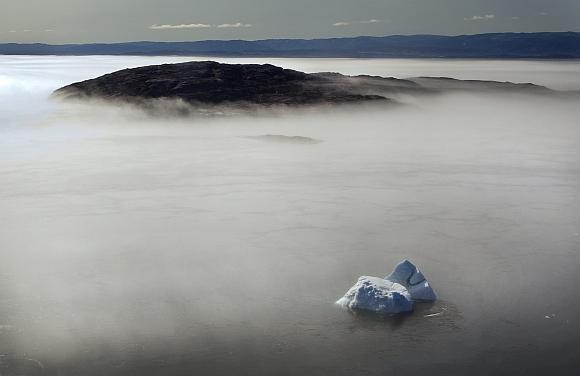
In an alarming sign, scientists have warned that Arctic sea ice is dramatically melting at a faster rate than previously thought, which may accelerate the effects of global warming. Rediff.com brings you some stunning pictures from the region.
A large iceberg is seen on the edge of a morning fog over Frobisher Bay, Nunavut in the Canadian Arctic. The picture was taken from a Canadian Forces Aurora patrol aircraft flying south of Iqaluit and taking part in military maneuvers in the Canadian north.
Photograph: Andy Clark/Reuters
Click NEXT to see more photographs
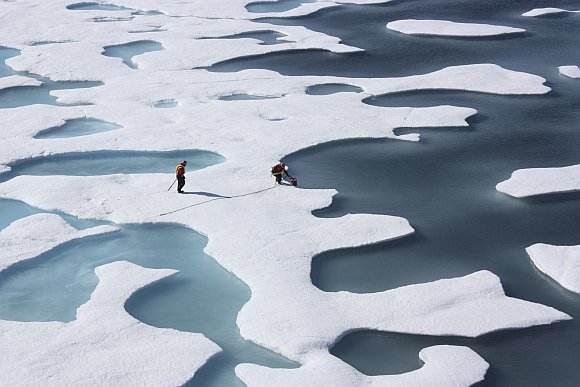
The crew of the United States Coast Guard Cutter Healy, in the midst of their ICESCAPE mission, retrieves supplies for some mid-mission fixes dropped by parachute from a C-130 in the Arctic Ocean.
Scientists punched through the sea ice to find waters richer in phytoplankton than any other region on earth. Phytoplankton, the base component of the marine food chain, were thought to grow in the Arctic Ocean only after sea ice had retreated for the summer.
Scientists now think that the thinning Arctic ice is allowing sunlight to reach the waters under the sea ice, catalysing the plant blooms where they had never been observed.
Photograph: Kathryn Hansen/NASA/Reuters
Click NEXT to see more photographs...
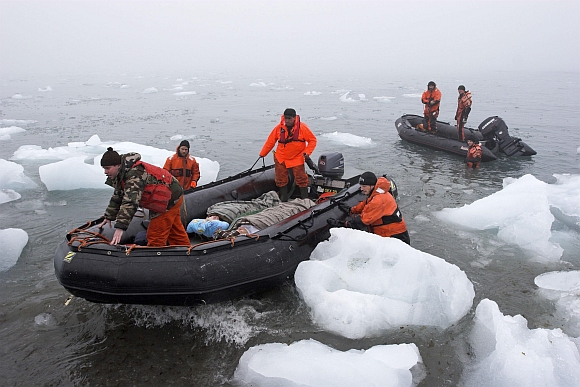
A passenger is evacuated after a chunk of an Arctic glacier broke into the sea and triggered a huge wave that injured 18 people on board the cruise vessel Alexey Maryshev.
Four people were seriously hurt in the accident by Hornbreen glacier on the Norwegian archipelago of Svalbard and were flown south to a hospital in Tromsoe on the mainland.
Photograph: Witek Kaszkin/Scanpix/Reuters
Click NEXT to see more photographs...
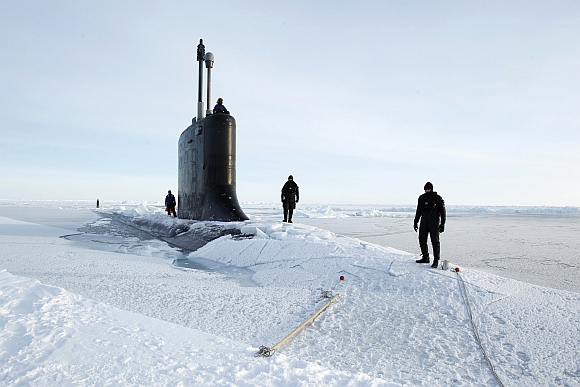
US navy safety swimmers stand on the deck of the Virginia class submarine USS New Hampshire after it surfaced through thin ice during exercises underneath ice in the Arctic Ocean north of Prudhoe Bay, Alaska.
Photograph: Lucas Jackson/Reuters
Click NEXT to see more photographs...
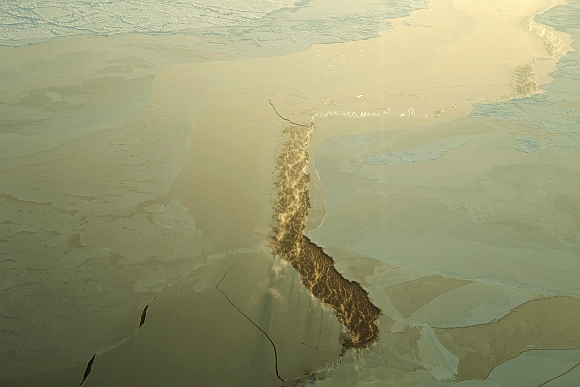
Steam rises from seawater through a crack in the Arctic ice near the 2011 Applied Physics Laboratory Ice Station north of Prudhoe Bay, Alaska.
Photograph: Lucas Jackson/Reuters
Click NEXT to see more photographs...
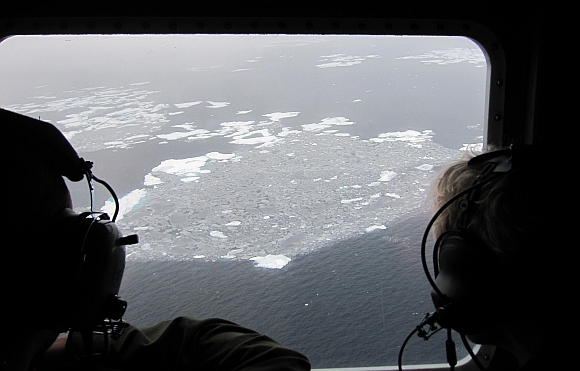
US Coast Guard flight loadmaster Kevin Fox (left) and University of Alaska Fairbanks scientist Rick Steiner survey ice conditions in the Beaufort Sea, about 200 miles from shore, from the window of a Coast Guard C130.
The flights are part of a regular 'Arctic Domain Awareness' program in which regular overflights are staged to get a sense of the environment and conditions far offshore.
The oldest ice is tinged with blue, and the newest ice is seen as a thin film on the water between existing ice chunks.
Photograph: Yereth Rosen/Reuters
Click NEXT to see more photographs...
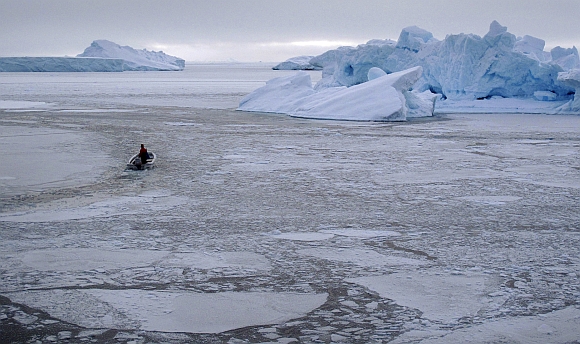
A small fishing boat heads out into the sea ice near the town of Uummannaq in western Greenland.
Photograph: Svebor Kranjc/Reuters
Click NEXT to see more photographs...
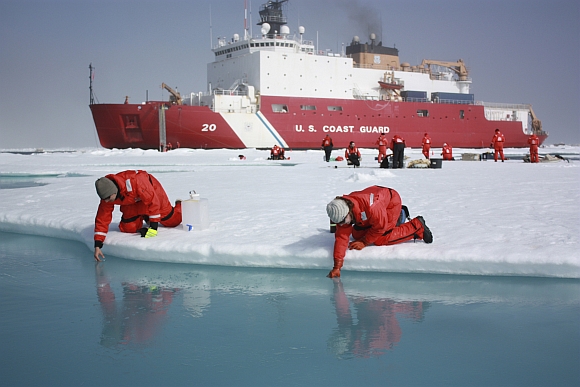
Scientists Jens Ehn (left) and Christie Wood scoop water from melt ponds on sea ice in the Chukchi Sea in the Arctic Ocean.
Photograph: Kathryn Hansen/NASA/Reuters
Click NEXT to see more photographs...

German Andreas Umbreit, who has lived for 21 years in the Norwegian Arctic town of Longyearbyen, points at open water in a fjord normally frozen solid.
He said that global warming may be to blame for the early spring thaw.
Photograph: Francois Lenoir/Reuters
Click NEXT to see more photographs...
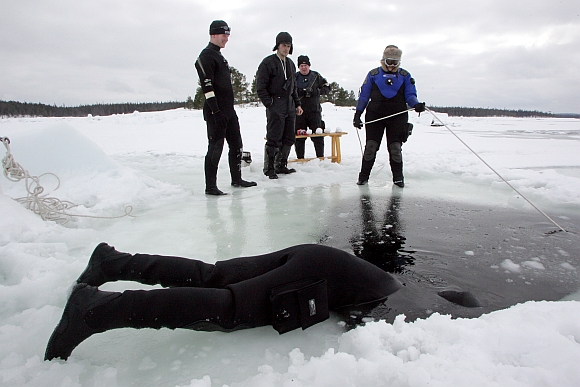
A diver, half immersed in water, checks on another diver during an ice-diving session on the coast of the White Sea near the village of Nilmaguba in the north of Russia's Karelia region.
The Polyarny Krug ice-diving base, situated at the edge of the Arctic Circle, was founded three years ago by marine biologists of Moscow State University as a research centre and to develop eco-tourism as an alternative to seal hunting.
Photograph: Sergei Karpukhin/Reuters
Click NEXT to see more photographs...
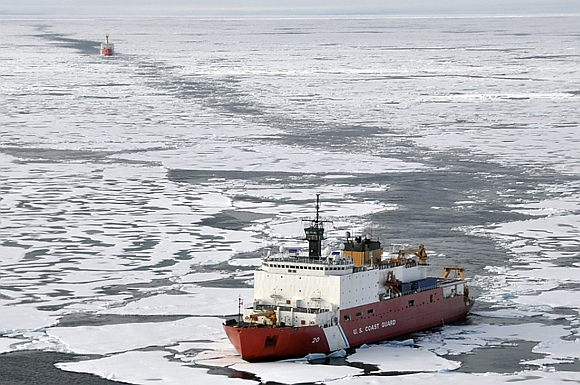
The Coast Guard Cutter Healy breaks ice ahead of the Canadian Coast Guard Ship Louis S St-Laurent during an Arctic expedition.
Government scientists will embark next week on a research expedition to monitor acidification trends in the Arctic Ocean, which is considered vulnerable to the effects of absorption of atmospheric carbon, the US Geological Survey said.
The USGS scientists will journey for seven weeks on the Coast Guard cutter as close to the North Pole as possible to take water samples and test for chemical indicators, officials said.
Photograph: Patrick Kelley/ US Coast Guard/Reuters
Click NEXT to see more photographs...
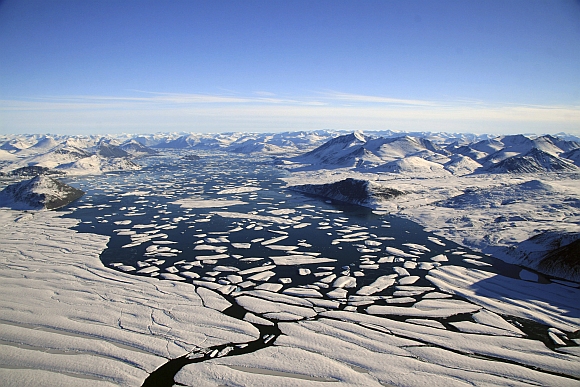
An photo from the Center for Northern Studies shows the Ward Hunt Ice Shelf disintegrating.
The incredibly rapid rate at which Canada's Arctic ice shelves are disappearing is an early indicator of the 'very substantial changes' that global warming will impose on all mankind, a top scientist said.
Photograph: Denis Sarrazin/Center for Northern Studies/Reuters
Click NEXT to see more photographs...
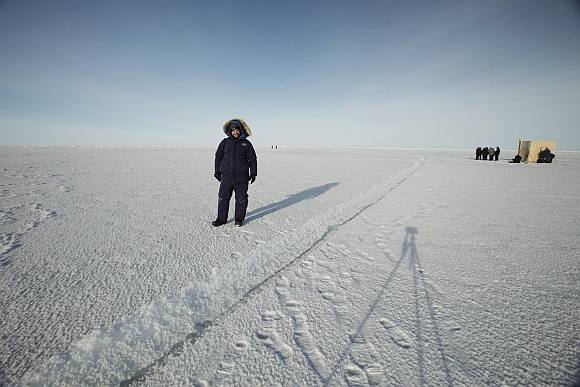
Reuters photographer Lucas Jackson takes a self portrait while waiting for a nuclear submarine to surface through the ice near the Applied Physics Lab Ice Station in the Arctic north of Prudhoe Bay, Alaska.
Photograph: Lucas Jackson/Reuters
Click NEXT to see more photographs...

Applied Physics Laboratory Ice Station employee Keith Magness (left) and Nick Michel-Hart cut a hole in the Arctic ice to hang sonar instrumentation for research at the 2011 Arctic APLIS camp north of Prudhoe Bay, Alaska.
The new digital 'Deep Siren' tactical messaging system built by Raytheon Co could revolutionize how military commanders stay in touch with submarines all over the world, allowing them to alert a submarine about an enemy ship on the surface or a new mission, without it needing to surface to periscope level, or 60 feet, where it could be detected by potential enemies.
At present, submarines use an underwater phone to communicate with associates on top of the ice or with other submarines, but those devices are little more than tin cans on a string and work only at shorter distances.
Photograph: Lucas Jackson/Reuters
Click NEXT to see more photographs...
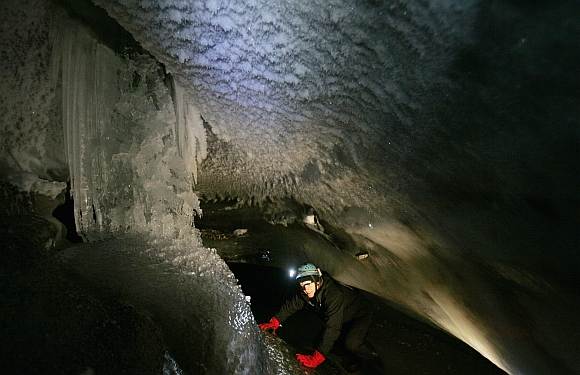
Dutch scientist Appy Sluijs examines ice in a cave at the bottom of the Longyearbyen glacier which has been shrinking fast in recent years.
Many experts link the thaw to global warming.
Photograph: Francois Lenoir/Reuters
Click NEXT to see more photographs...
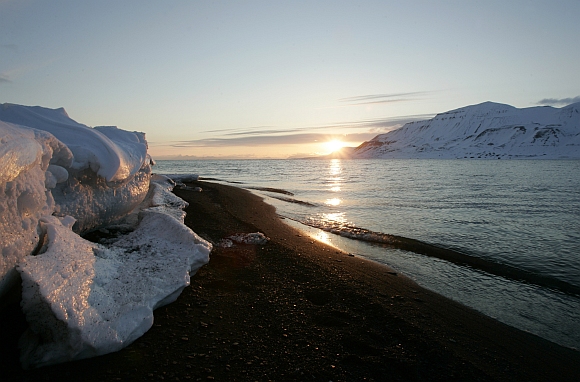
The sun shines low in the sky just after midnight over a frozen coastline near the Norwegian Arctic town of Longyearbyen. The sea water is normally frozen solid at this time of year but global warming may be warming the region.
Photograph: Francois Lenoir/Reuters
Click NEXT to see more photographs...

A plane takes off from an ice runway near the Applied Physics Lab Ice Station to return to Prudhoe Bay in the Arctic north of Prudhoe Bay, Alaska.
Photograph: Lucas Jackson/Reuters
Click NEXT to see more photographs...
...